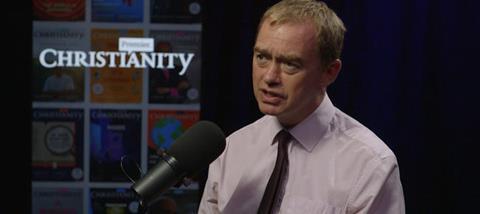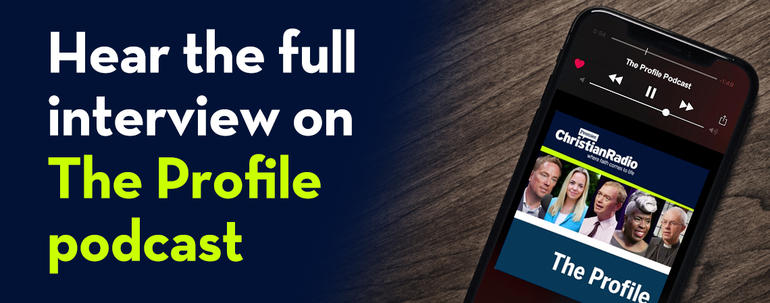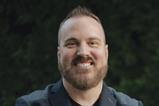The politician tells Sam Hailes how the “trials and tribulations” he experienced while leading the Liberal Democrats have enabled him to be more open about his faith. He also explains how reading books on prophecy and apologetics played a key part in his decision to become a Christian

It’s two years since Tim Farron was caught up in the mother of all media furores. The then leader of the Liberal Democrats hoped the 2017 general election campaign would be an opportunity to make the case for remaining inside the EU. Instead, the media became fixated on repeatedly asking him one very specific question.
“Do you believe gay sex is a sin?” Farron was asked over and over again – in almost every interview he gave for weeks on end. Initially, he avoided giving a direct answer, but as the question refused to go away, the leader was faced with an unenviable choice: let his party down or compromise his faith. In the end, he gave a BBC interview in which he uttered the words he hoped would end the scrutiny: “I do not believe gay sex is a sin.” (Later, he told Premier Christian Radio he regretted that answer. “I attempted to push it away by giving an answer that frankly was not right,” he said.)
When he resigned from leading the Liberal Democrats one week after that election, Farron admitted his answers to journalists “could have been wiser”. “Even so, I seem to be the subject of suspicion because of what I believe and who my faith is in. In which case we are kidding ourselves if we think we yet live in a tolerant, liberal society,” he said.
During our lengthy conversation in the Premier Christianity studio, a short walk from Westminster, Farron was reluctant to blame the media for what happened. He also baulked at the idea that Christians in the UK are persecuted. Misunderstood, and marginalised perhaps, but not persecuted. His experience has raised all sorts of questions about how our society views evangelicals. But Farron doesn’t want Christians to get side-tracked too far down that road:
“What we want is people to hear the gospel, not a row about where the culture is at,” he tells me.
In majoring on a single issue, Farron’s opponents showed no interest in the true depth of the Lib Dem leader’s Christian faith. Regardless of whether or not you agree with Farron’s religious or political views, one can’t help but sympathise with a man whose tenure as party leader became defined by this single issue.
Farron speculates that his return to the business of his constituency after being party leader would have looked like a demotion to some of his colleagues. But the 49-year-old is adamant that being the MP for Westmorland and Lonsdale is “a total joy”. He also appears to be enjoying a new-found sense of freedom when it comes to talking about matters of faith – his autobiography A Better Ambition (SPCK) will be published next month – and Farron is aware that the “trials and tribulations” of his leadership have given him a bigger platform to share his faith. “God knows what he’s doing,” he smiles.
What was family life like for you growing up in Lancashire?
My parents were very young when they got married, and very young when they got divorced. I was not quite five when my parents split up. We were not in any way well off; my parents suffered bouts of unemployment, so financially we had quite a tough time growing up; we didn’t have holidays. But one of the marks of a wonderful parent is that the child doesn’t realise they were poor until they grow up and look back.
You joined the Liberal Party aged 16. Where did your interest in politics come from?
I watched Cathy Come Home. It was an utterly ground-breaking piece of cinema about Cathy and her husband, Reg – working-class people. Reg has a bout of illness and therefore loses his job. Then they lose their home, they’re in temporary emergency accommodation, they split up. Cathy and the children are turfed out and the credits roll with Cathy crying out: “You’re not having my kids”, as social services take them off her. And then comes the phrase on the screen afterwards: “Everything that happened in this film really happened in the last 12 months”.
I also remember watching Live Aid in 1985 and being struck that the famine in Ethiopia was not an accident; it was a consequence of human wickedness, human and political failure, and therefore I should do something about it. And so I joined the Liberals.
How did you become a Christian?
I was not churched as a youngster; although I had an awareness of faith. Religious Education was 90 per cent scripture back in those days.
As I was preparing for my A levels, my mum came home from work – she was a lecturer at Preston Polytechnic – and said she’d been seconded to a college in Singapore. My sister and I ended up going out with her. My new bedroom still had stuff in it from the previous tenants – who were Christians. It rained quite a lot, and so I read a whole bunch of books they’d left there. You’d probably categorise them as apologetics and prophecy. I remember reading stuff about Daniel. The penny dropped with me: “Oh crumbs, it’s all true.”
I’d thought that Christianity was a bit weird, unattractive and restrictive. I did not see myself as the kind of dupe who’d fall for religious nonsense. And I still don’t consider myself the kind of dupe who falls for religious nonsense, but I think by the grace of God I’m someone who knows the truth when he sees it.
Some people doubt the effectiveness of apologetics, yet in your case it sounds like the intellectual arguments helped convince you?
I think the thing about apologetics is, first of all, people become Christians because the Holy Spirit moves them to become Christians. But God uses us – and it’s a great privilege – in order to help deliver that message.
The ego-shattering consequences of the gospel being true are enormous. And so God graciously gives us things that actually work with the things that we hold dear in our intellect. The books I read were not finger-pointing, argumentative apologetics. My job – and any of our jobs as Christians, if you’re trying to win someone to take Jesus seriously – is not to beat them in an argument. It’s to calmly, graciously, politely make the case for the gospel.
I can think of Christians who are very passionate about issues which might be branded ‘right of centre’ – family, sexual ethics, euthanasia. I can also think of Christians who campaign very strongly on ‘left of centre’ issues – the climate, welfare or refugees. Are you someone who would want to seek to bridge that divide and say as Christians we should care about all of those things?
I think you make a very good point there. Amos is a wonderful book – I got to grips with it a little bit a few years ago. You see the comprehensiveness of God’s righteous anger against all that’s wrong. And that can include the social wrongs – inequality, the complacency and disinterest of the wealthy in the face of poverty and exploitation. And it also shows anger at what we might refer to as personal morality. And so that’s a rebuke to us all. Either what God is telling us is the truth and we need to humbly fall before him. Or we’re nit-picking and deciding we know better than God.
When you resigned from leading the Liberal Democrats you said: “To be a political leader – especially of a progressive liberal party – and to live as a committed Christian, to hold faithfully to the Bible’s teaching, has felt impossible for me.” What’s your memory of that time?
Well, I think those seven weeks – the 2017 election campaign – was an incredible pressure cooker. It was a tough decision, but it wasn’t that tough once I’d made it. I thought: “It doesn’t do the party any good at all if their leader is just constantly hounded on issues of faith. I felt my choice was to be a bad leader or a bad Christian, and that’s a rubbish choice, so let’s not be leader and seek to be faithful.”
Did you feel like it was your own decision?
Oh yes, 100 per cent.
There wasn’t pressure from others to say…
Well, I mean, this sounds a bit pompous: but I’m 100 per cent confident if I’d wanted to stay on, I’d have stayed on. I feel very much at peace with the decision that I made.
Having stopped being leader, and being someone who is a relatively well-known Christian, the opportunity for me to use that platform to share my faith is an enormous blessing, an enormous privilege, and I wouldn’t have had it had I not been through what I went through. So God knows what he’s doing.
People have looked at what happened to you and said this means it’s no longer possible to be a Christian with traditional biblical views on sexuality and hold high public office. Are they right?
I’ve served as an MP for 14 years; I was president of the party; I was leader of the party. So if there’s a glass ceiling for Christians in politics, it’s reasonably high. And someone wiser than me could have navigated a path through it.
There is this notion of Christians in the West being persecuted. I think we are misunderstood, and we are marginalised to a degree, but it’s nothing compared to the real persecution elsewhere. How should Christians respond to that marginalisation? It’s not to be tetchy and whiny and ratty; it’s to be gracious, it’s to turn the other cheek, it’s to model the forgiveness towards others and the grace towards others that they don’t show to us.
It has been said before that Catholics are always quizzed by journalists on abortion, Muslims on terrorism and evangelicals on homosexuality…Do you blame the media for the way you were treated?
Any politician who complains about the media is like a sailor complaining about the sea – it is what it is. I think there is a broader issue in society, where there is a failure to understand faith, and a creeping lack of liberalism in quarters that would call themselves liberal. The assumption in 2019 appears to be that the absence of faith is neutral; that the holding of a faith is a wacky eccentricity that we’ll just about tolerate – but only just. And I would say that’s illiberal and silly – because there is no such thing as a neutral point of view.
I’m somebody who believes in a secular society; I’m very much strongly opposed to a clerical state – I even think the Church of England should be disestablished. But just as I oppose Christianity being the State faith, I also 100 per cent oppose atheism as the State faith, and that appears to be where we’ve got to in reality. A real liberal society is one where different worldviews hold together in the same space. Not one dominant one telling all the other ones they’ve got to genuflect towards them.
While you were being hounded on your views about homosexuality, you pointed out you’d consistently voted in favour of LGBT rights. And yet some people didn’t care, they wanted to know what your personal beliefs were. Do you think there’s now a ‘thought police’ culture where it doesn’t matter how you voted – what really matters is what you think?
That’s an interesting observation on where we might have got to at the moment, but I think in the end the critical thing for us to remember in a free society is that we need to defend people’s right to be members of whichever minority it happens to be.
We observe religious illiteracy in this particular age – and that’s fair enough. But I think we also need to understand that Christians ourselves can be guilty of political and cultural illiteracy, and not understand quite how we’re heard. So we need to have compassion. What we want is people to hear the gospel, not a row about where the culture’s at.
And remember that Christianity is always counter-cultural. In times past, the place where the culture and the gospel would have rubbed up against each other most uncomfortably would have been over slavery or legalism or militarism or materialism. It appears today to be against issues to do with personal morality and radical individualism. And in the next generation it’ll be something else. The point is that Christianity is always going to be challenging; it is an enormous affront to your ego, to my ego, to everybody’s ego, to realise that we aren’t our own, and that we are answerable to one higher, who loves us immensely, who is 100 per cent just and pure, and we’re not.
How important is your local church in helping you navigate all this?
Church is massively important; we go to Parr Street evangelical church in the town of Kendal, it’s very much focused on Bible-teaching, and a great church, really well-led.
I was talking to a new Christian MP and I pointed out that the nature of our work means that you often end up not being able to attend a small group. And that’s been a real problem for me and my family. In terms of some of the issues where I may have not performed as well as I might over the years, some of it is down to the fact that you can become a coal out of the fire if all you do is go to church on a Sunday. So it’s really important to have close fellowship with other Christians.
My advice for everybody, doesn’t matter what you do, really, is: stay rooted in a community of Christians where you’re hearing the Bible preached truthfully and where you’re accepted and loved.
What’s been the best day of your career?
The day after I stepped down as leader, I went up to a primary school in Langdale and they were all asking me quite serious questions about Brexit and farming and tourism. Then one little seven-year-old girl asked: “Do you help people with their passports?” And I thought: “Random! Drag your memory banks, Tim!” So I said: “Yes, as it happens, a few years ago there was a couple whose son went to live in Brazil – he met a lovely lady; they got married, had a baby – but they couldn’t bring the baby back. And we worked very, very hard, and eventually we got the baby a passport, and it all ended well.” And she put her hand back up and said: “That was me!” And of course, everyone else in the audience knew, and I had a little cry.
What would you say to a young person who wants a career in politics and is a Christian?
Make sure that you’ve got plenty of people around you with whom you can have good fellowship – faithful Christians who will hold you to account. And make sure some of them – not necessarily all of them – are reasonably politically savvy as well.
The other thing is, I’m blessed in the sense that the internet wasn’t a thing when I was young. I think all of us need to be careful now that our every utterance is online; it’s there for posterity and for opposition to rake over. Being careful with what you say and the opinions that you express is something we should all seek to do, so that you don’t turn up at the grand old age that I am and find that you are hoisted by a petard that you strung up 30 years earlier.
What does the future hold for you?
Some people who go from leadership to being a back-bencher treat it like it’s some terrible loss of status and a demotion. I think totally the opposite. Being the MP for our area is a total joy, and so I don’t need to rouse myself in the morning to get up and do it – I absolutely love it.
I use a fraction of the time that I gave up to be leader to work with my organisation Faith in Public. And the role of that small organisation is to help me to speak openly about my faith – to share it and to encourage Christians, and hopefully to win a hearing from those who aren’t yet.
If I’d not been through the trials and tribulations of my leadership, I’d not be in the position that I am in now where I can openly talk about my faith. If you’ve given up the thing that you most wanted to achieve in life – for me it was being leader of my party – because there’s something more important, it’s so important you then focus on that thing, which is following Jesus.






































